…by Jonas E. Alexis
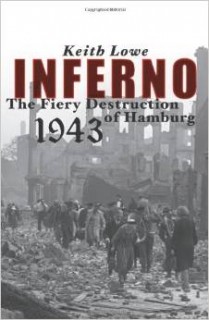 Historian Keith Lowe declares at the beginning of his 2007 book Inferno: The Fiery Destruction of Hamburg that “I am aware that this book might have made uncomfortable reading for some.”[1]
Historian Keith Lowe declares at the beginning of his 2007 book Inferno: The Fiery Destruction of Hamburg that “I am aware that this book might have made uncomfortable reading for some.”[1]
Why? Did Lowe fear that Inferno would upset the Holocaust establishment? Who are those people who would feel uncomfortable reading the book?
If Lowe is presenting facts, why would some people be uncomfortable with them in the first place? And what is it that Lowe is actually saying in the book that would make people so upset?
We all know that serious historical scholarship can be an uncomfortable territory, particularly for those who do not have enough guts to tell the truth and follow it wherever it leads. In fact, historical truth and artifacts can bring emotional pain and wounds. As intellectual historian Mark Lilla rightly put it,
“Whoever takes it upon himself to write an honest intellectual history of twentieth-century Europe will need a strong stomach. But he will need something more. He will need to overcome his disgust long enough to ponder the roots of this strange and puzzling phenomenon.”[2]
Lowe seems to have a strong stomach when it comes to examining the destruction of German cities, but he does not seem to possess the intellectual courage “to ponder the roots of this strange and puzzling phenomenon.”
Furthermore, Lowe lacks the moral courage to tell us quite frankly who the culprits really are. And we shall see why in a moment. Lowe writes,
“There is still a great deal of bitterness toward Germany, despite the decades that have passed, and many people simply do not care if the Germans suffered or not.
“During the course of my research, I have spoken to scores of people—Jews, Gypsies, Poles, Danes, Dutchmen, Frenchmen, the list goes on—who have listened to my descriptions of the Hamburg firestorm and merely shrugged their shoulders. ‘It was their own fault,’ is the standard reply. ‘They started it.’
“I would be surprised if even the most intransigent of these people could remain unmoved by some of the eyewitness accounts of the firestorm and its horrific effects.
“In Germany it remains virtually impossible to mention the bombs without the immediate acknowledgement that it was they who opened Pandora’s box in the first place.”[3]
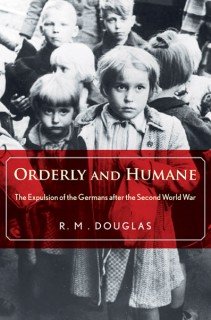 Lowe, like noted historian R. M. Douglass and Hans Erich Nossack,[4] indicates that popular historians have been doing a terrible job documenting what happened to German cities after World War II. Lowe declares,
Lowe, like noted historian R. M. Douglass and Hans Erich Nossack,[4] indicates that popular historians have been doing a terrible job documenting what happened to German cities after World War II. Lowe declares,
“I have been consistently surprised by the general ignorance of these facts among my own countrymen.
“In the course of the two years of writing [Inferno] I have come across very few people outside the world of military historians who knew that Hamburg was ever bombed at all, let alone the sheer scale of the destruction that took place.
“Hamburg is a byword for horror, and yet in Britain few people know it even happened.
“In North America, too, there is widespread ignorance of the basic facts, although to some extent America’s geographical and emotional distance from Hamburg excuses this.
“Even those who have heard of the Hamburg firestorm are generally unaware of its ghastly human consequences.”[5]
Lowe’s frustration is understandable. I too have been flabbergasted by some of the most ridiculous statements ever uttered by one of my historian friends with respect to Nazi Germany.
After a long conversation, during which I challenged some of his sources, he then turned around and questioned archival documents, saying things like, “How do I know that I should trust them? How do you know they are not fabrications?”
I specifically bought him a copy of R. M. Douglass’ Orderly and Humane: The Expulsion of the Germans after the Second World War. I told him to read it and we generally agreed to discuss it.
After a few weeks, he came back with his conclusions. I simply could not believe what I was hearing from him. His main objection was that he could not trust Douglass’ citations and conclusions because they are hard to verify, since most of them are from historical archives.
Now here is a man who frequently cited secondary sources, but all of a sudden he cannot trust archival documents! Why?
Obviously the documents did not line up with his preconceived notion. Yet he did not know that he was making my job easy. I agreed with his thesis only to destroy it later. I responded,

“Well, well, well. That begs the question, doesn’t it? If you want to go to great length to challenge archival documents, which are some of the finest historical artifacts we have, shouldn’t you do the same thing with secondary sources?
“Don’t you laboriously cite secondary sources to me as your authority? Don’t you repeatedly say that Hitler wanted to exterminate all the Jews in Europe, a historically preposterous and mathematically implausible idea?
“Are you seriously saying that secondary sources are more reliable than archival and primary documents? Is that an intellectually sound position?”
He slowly got a little quiet. He is a military man, and I am not. He went to the Gulf War and knows much more about warfare than I do. He got shot at twice and at one point he almost got killed by a hand grenade.We have been friends for more than two years and he has shown to be a gentleman. Yet his ideological worldview does not allow him to see the obvious.
What I have learned last year and what I am still trying to understand is that some beliefs are so dear to some people that they are willing to die for them—even if those beliefs could be demonstrably shown to be false.
I simply am appalled when I read some of the stuff that is out there and some of the statements that people try to put out in order to make a point. I sometimes simply have to ignore them precisely because many of those statements are simply silly and sophomoric.
And then you’ve got other people who believe that when you refute an argument or declare that an argument is silly or sophomoric or preposterous or irrational, you somehow are attacking the person who posited the argument in the first place![6]
That really was news to me precisely because I thought this was a non-issue among serious academics and scholars.
It is really discouraging when people who ought to know better would even remotely suggest that by attacking an argument, you somehow dislike the person positing the argument.
For example, after arguing against one of Plato’s arguments, eminent philosopher Julia Annas of the University of Arizona declares that
“This gives Plato a very silly argument, and we should try to do better if possible.”[7]
Was she personally attacking Plato? Did Annas somehow have some animosity toward the ancient Greek thinker? Did she really despise him as a human being?
Or did Annas have to make a list of things that she likes about Plato so that readers would know that she really does not have some animosity toward him?
When mathematician John Allen Paulos for example talks about “an intentionally silly argument”[8] and compares the trinity to an “obviously silly” statement,[9] or that the argument for miracle is “beyond silly,”[10] was he personally attacking the people who produced the argument? Can we seriously deduce that Paulos somehow hates those people just on that premise alone?
Moreover, have people even read popularizers such as Richard Dawkins, who make it very clear that some arguments are really silly?[11]
When David Hume declared that “I never asserted so absurd a Proposition as that anything might arise without a cause,”[12] was he personally attacking those who maintain this view?
What is even more disheartening is that if you evidentially point out that some statements are demonstrably false, the same people who produce those statements continue to uphold and defend them as if facts and evidence simply do not matter!
Sometimes it is just disappointing to know that some of those people graduated from many of the top universities in the country, where they should have been trained in logic and rigorous and solid argumentation.[13]
[youtube V6UjtlHCXhA]

Going back to Lowe, he is far from alone. Richard J. Evans of Cambridge, in reviewing Douglass’ Orderly and Humane, noted quite rightly,
“At the end of World War II, between twelve and fourteen million people, ethnic Germans, were forcibly expelled from Eastern Europe, or, if they had already fled, were prevented from going back to their homes.
“Others were detained in appalling conditions in concentration camps for weeks, suffering from disease, starvation, and maltreatment, before they were brutally pushed out to the west.
“Long lines trudged towards Germany, with the weak succumbing to hypothermia and malnutrition. Altogether probably half a million and perhaps as many as a million perished in what was the largest action of what later came to be known as ‘ethnic cleansing’ in history.
“This massive act of expulsion and forced migration is still largely unknown outside the countries most closely affected by it. The story appears in standard histories of Germany and Europe in the twentieth century as little more than a footnote.”[14]
So far, so good.
But the question that Evans should ask himself is simply this: whose fault is that? Is Evans really telling us that he is not an accomplice in all this? Didn’t he defend Jewish thought police Deborah Lipstadt in court?
And didn’t Evans get thousands of dollars in return? Didn’t he get to write books for major New York publishing houses while those same publishers did not want to reprint David Irving’s books because Irving said some uncomfortable but true things about what he called “the traditional enemy of the truth”?
Does Evans mean to tell us that he doesn’t know that Lipstadt calls just about anyone she does not like an anti-Semite? Doesn’t Evans know that Lipstadt even called Jimmy Carter—of all people!—a soft-core denier for writing Palestine: Peace Not Apartheid?
Doesn’t Evans know that Lipstadt tried to get people fired from their academic positions just because they expose lies as perpetuated by hoaxers like Elie Wiesel?[15] Here’s what Lipstadt said about the noted German historian Ernst Nolte:
“Historians such as the German Ernst Nolte are, in some ways, even more dangerous than the deniers.
“Nolte is an anti-Semite of the first order, who attempts to rehabilitate Hitler by saying that he was no worse than Stalin; but he is careful not to deny the Holocaust.
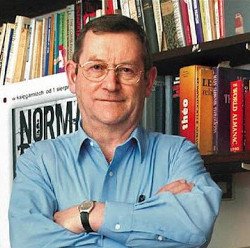
“Holocaust-deniers make Nolte’s life more comfortable. They have, with their radical argumentation, pulled the center a little more to their side.
“Consequently, a less radical extremist, such as Nolte, finds himself closer to the middle ground, which makes him more dangerous.”
Lipstadt is simply a double-minded person. For example, in 2011, she declared that
“If anti-Semitism becomes the reason through which your Jewish view of the world is refracted, if it becomes your prism, then it is very unhealthy. Jewish tradition never wanted that.”
She even added that
“The ‘hysteria’ and ‘neuroses’ of many Jews and Israelis who compare the current situation in Europe and in the Middle East to the Holocaust era. ‘People go nuts here, they go nuts.
“There’s no nuance, there’s no middle ground, it’s taking any shade of grey and stomping on it. There are no voices of calm, there are no voices of reason, not in this country, not in Israel.’”
Yet when the Israeli regime was getting a huge backlash for slaughtering innocent civilians in Gaza just a few months ago, Lipstadt took the center stage and declared in the New York Times that Anti-Semitism “was rooted in longstanding Christian views that demonized the Jews.” She then concluded:
“The telegram has arrived. Jews are worrying. It is time for those who value a free, democratic, open, multicultural and enlightened society to do so, too. This is not another Holocaust, but it’s bad enough.”[16]
Going back to Evans, has he already forgotten that he is the author of the new book Altered Past: Counterfactuals in History, in which he takes it as a brute fact that six million Jews died in Nazi Germany.[17]
Evans indeed is part of the Holocaust establishment,[18] but somehow he is trying to distance himself from the very circle which, at this present moment, holds the West captive when it comes to probing historical enquiry and research.
In the same vein, Keith Lowe certainly should know that there is a Jewish establishment in the West that seeks to usurp serious historical knowledge.
Lowe, like Evans and others, should know that there is a book out there by a Jewish ideologue entitled Hitler’s Willing Executioners: Ordinary Germans and the Holocaust, in which its author argues that ordinary Germans play a crucial role in bringing about Nazi Germany.
The author of the book, Daniel Jonah Goldhagen, tells us in an afterthought that those ordinary Germans were certainly “anti-Semites who believed that exterminating Jews was right and necessary.”
If you happen to challenge that premise on a rational and historical ground, Goldhagen will try to sue you.[19]
Lowe does not even analyze Goldhagen’s book in his Inferno. Nor does he discuss the ideological forces behind those who try to cover up historical events with respect to what happened during and after World War II.
Why?
Well, if Lowe even mentions the names of those people, he probably would not be able to publish books for major New York publishing houses. He almost certainly would be sent to academic Siberia. He probably knows what happened to historians and academics such as Norman Davies and Norman Finkelstein.
[youtube mSwVz7JTRCA]
We all know what happened to Norman Finkelstein. But when Norman Davies challenged the accepted views of both the Holocaust in Nazi-occupied Poland and the Stalinist regime in Soviet Union, he was ultimately denied tenure at Stanford University.
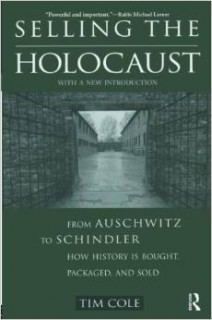 His accusers were none other than the Dreadful Few, most notably Jewish historians Lucy S. Dawidowicz and Abraham Brumberg. A Stanford University article reads:
His accusers were none other than the Dreadful Few, most notably Jewish historians Lucy S. Dawidowicz and Abraham Brumberg. A Stanford University article reads:
“Davies’s works have been criticized at Stanford and elsewhere, by such experts as Lucy S. Dawidowicz (author of The War Against the Jews: 1933-1945) who said they felt Davies minimized historic anti-Semitism in Poland and tended to blame Polish Jews for their fate in the Holocaust.
“Davies’ supporters contend that Poles suffered as much as Jews did in the war and could have done very little to save any of the 3 million Jews living in Poland at the time of the Nazi invasion in 1939.
“Davies had sought $3 million in damages from the university for what he called fraud, misrepresentation, breach of contract, discrimination and defamation.”[20]
Davies suddenly realized that the Dreadful Few were a lot more powerful than he ever imagined. He eventually moved to England, where he taught history at the University of London and later became a fellow at Oxford.
Davies is not an obscure historian. His scholarly works include God’s Playground: A History of Poland (in two volumes); Europe: A History; No Simple Victory: World War II in Europe, 1939-1945; and Heart of Europe: The Past in Poland’s Present.
Yet in 2005, Davies dropped a historical bomb that implicitly devastated the Holocaust establishment, writing a sharp critique of both the Soviet Union and Nazi Germany, which was published by the Sunday Times.
After demolishing many of the arguments as articulated by the Holocaust establishment, Davies declared,
“On the ideological front, westerners are accustomed to thinking of the second world war as a two-sided conflict, of good fighting evil.
“The Soviets had a similar dialectical view. They were the authors of the concept of antifascism, which caught on in the West, encouraging the illusion that all opponents of fascism were inspired by similar values.
“In reality, Soviet communism was as hostile to western democracy as it was to fascism. Stalinist practices, however, undermine the entire moral framework within which the allied cause is perceived.
“It is not possible to maintain that the allies were fighting for untrammeled good if the largest of their members was habitually given to mass murder.
“Before 1941, enough was known about Stalin’s concentration camps, purges, show trials and state terror that western leaders had no excuse for ignorance. Yet such was the desperate need for Soviet military assistance that all western suspicions were suspended.
“During the war, there were thousands in London and Washington who had witnessed Stalin’s camps and murders. But they were effectively silenced by war censorship, and sometimes by military discipline. Officers caught discussing what they had heard about Stalin’s crimes were threatened with courts martial.
“Even Churchill, who had been a strident anti-Bolshevik and who admitted to ‘supping with the devil,’ warmed to the blandishments of success.
“When victory finally came, very few were willing to count the political and moral cost. At the Nuremberg trials, three categories of criminal conduct were established: crimes against peace (i.e., wars of aggression); war crimes and crimes against humanity.
“By any reckoning, Stalin’s regime deserved to stand trial on all counts. It had been expelled from the League of Nations for crimes against peace. While defeating the Wehrmacht, its forces had perpetrated numberless atrocities.
“And in pursuing policies of mass murder, mass deportation, repressions and ethnic cleansing the Soviet state had manifestly entered the realm of crimes against humanity.
“Yet in the victory euphoria, they need not have feared a public reprimand, let alone a formal accusation. When German defence lawyers at Nuremberg protested on this score, they were cut short by the chairman, Sir Geoffrey Lawrence.
“‘We are here to judge major war criminals,’ he reminded the court, ‘not to try the prosecuting powers.’ Meanwhile, the notion of a general ‘liberation’ of Europe was false.
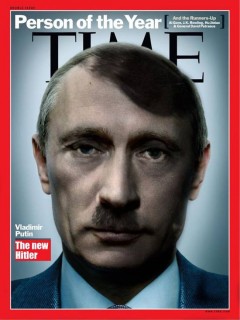 “The liberation was genuine enough when the allies entered Rome, Paris or Brussels; and it was dramatically evident when allied soldiers rescued the survivors of Belsen, Buchenwald or Auschwitz.
“The liberation was genuine enough when the allies entered Rome, Paris or Brussels; and it was dramatically evident when allied soldiers rescued the survivors of Belsen, Buchenwald or Auschwitz.
“But in eastern Europe, Soviet forces imposed a new tyranny as soon as the Nazi tyranny was crushed. Buchenwald was emptied of one set of inmates, then used for another.
“At the very time that Auschwitz was being liberated in January 1945, other camps like Majdanek were filling up with members of the resistance movement (our allies) whom the NKVD regarded as enemies.
“Wartime heroes, flown into continental Europe by SOE and the RAF, were cast into Soviet dungeons. Democrats were arrested, shot or put on trial.
“Vast tides of innocents, including all Soviet prisoners of war who had survived German imprisonment, all so-called ‘repatriants’ handed over by western forces, and most of the slave workers returning home from Germany were shot or shipped off to the Gulag. Puppet dictatorships were introduced by force into country after country.”[21]
Davies also indirectly cut the Goldhagen thesis to pieces when he said,
“For every European who was involved in the fighting of the Second War, there were at least ten civilians who were not directly involved but who nonetheless were forced to suffer the painful consequences of international conflict.”[22]
There was no way for Davies to survive the Zionist regime’s machination of historical events. But he certainly was not the only individual to challenge the powers that be. Listen to Norman Finkelstein in his 2000 book The Holocaust Industry:
“Articulating the key Holocaust dogmas, much of the literature on Hitler’s Final Solution is worthless as scholarship. Indeed, the field of Holocaust studies is replete with nonsense, if not sheer fraud. Especially revealing is the cultural miliew that nurtures this Holocaust literature.”[23]
Finkelstein of course had people like Daniel Jonah Goldhagen, Eli Wiesel, and Deborah Lipstadt in mind. Those people can meticulously craft a palpable lie in such a way that the average person who knows little about World War II will accept it as brute facts. Why do you think that Elie Wiesel received so many accolades and media attention over the past few decades?
Lowe does not want to be another Zionist casualty or victim. He also should know that there is a book out there called Genocide Denial and the Law, in which it is stated in a perverse way that “Holocaust deniers” should face harsher punishments—such as imprisonment if necessary.[24]
The premise of that particular book is absolutely worthless precisely because it can only be applied to “Nazi Holocaust.” If we extrapolate the same thesis to other historical events, then Jewish historians such as Bernard Lewis and others would be in jail for denying the Armenian genocide, an issue we will address in the future.
This is why Lowe can never be a good cop because he never got the intellectual and moral courage to tell us the real culprits who are playing fast and loose with historical artifacts.
[youtube Lrz2B9Stipw]
Furthermore, Lowe does not tell us that major media publications such as the New York Times play a huge role in brainwashing the masses.
It just gets to a point now that the New York Times doesn’t surprise thinking people anymore with countless stories of “Nazi Holocaust” and with little or no historical depth and honesty and fair balance.[25]
It seems that editors and writers for the Times make sure that at least one story with respect to “the Holocaust” be published every month.
In fact, if you have been living on a steady diet of mass media and Hollywood manipulation in movies such as Inglorious Basterds—and to a lesser degree in Hellboy, Captain America, etc.—then you now know that Nazi Germany was the darkest era in recent memory.
Yet none of those editors and writers would be willing to publish the awful tragedies that literally fell upon the German civilians after the war precisely because that would ruin their daily wining and moaning.
That also means that some of those editors will have to find a serious and honest job other than producing hoaxes about Nazi Germany.
Writers and editors at the New York Times are certainly not oblivious to what has been happening in the historical world. They know pretty well that serious scholarly studies have been done over the past ten years unequivocally showing that German civilians indeed suffered tremendously after the war and the vast majority of those people had nothing to do with Nazi Germany.
Yet those New York Times writers continue to moan because the powers that be tell them what to think and what to write about. The powers that be tell us ad absurdum that no crime in history can be compared to what happened to the Jews in Nazi Germany. As Abraham Foxman himself declared a few years ago:
“The Holocaust is something different. It is a singular event. It is not simply one example of genocide but a nearly successful attempt on the life of Gods’ chosen children and, thus, on God himself.”[26]
If the “Holocaust” is actually “a single event” and unique, then there is no way to compare it with other historical events. But the Dreadful Few always violate that rule whenever they want to destroy a new country or leader.

Didn’t they compare Saddam Hussein to Hitler?[27] Didn’t they produce fabrications saying that Ahmadinejad was another Hitler?[28] Didn’t they place Vladimir Putin on the front page of the Times with a Hitler mustache?
Didn’t Paul Johnson help the Dreadful Few by marshalling the ridiculous argument that Putin was following Hitler’s ideology?[29] Didn’t the Dreadful Few and their puppets preposterously declare that Assad joined Hitler in ideology?
As a corollary, if the Dreadful Few really believe that Hitler was that bad, why don’t they go after Hollywood which, as some Jewish scholars have argued, aided Nazi Germany?[30]
Nazi Germany was the greatest evil in the twentieth century, but Jewish towns such as Hollywood that actually helped Nazi Germany get a free pass? Does that make any sense at all? What the Dreadful Few end up saying is that if Hitler didn’t exist, they would invent him.
Furthermore, why is it that we have hundreds upon hundreds of “Holocaust” movies and nothing about the Russian Holocaust, the Chinese Holocaust, the Vietnamese Holocaust, etc.?
Chinese scholar Mao Yushi, who actually was in his early 30s when Mao took over the country and who suffered tremendously as a result, recently declared that the Great Famine took the lives of 36 million people.[31] This is very close to what historian Frank Dikotter has said.
In a similar vein, Jo Lusby, head of China operations for Penguins, declared that “The Chinese people were cheated. They need real history.”[32]
Indeed. They are still being cheated because the Holocaust establishment does not want to examine all historical events by the same standard. Everyone has to know about “Jewish Holocaust” and other historical events are just an afterthought.
For example, Inglorious Basterds, which is about Jewish vengeance, received numerous accolades in the Jewish establishment when it came out. In fact, Abraham Foxman declared that Inglorious Basterds “should be recognized with an Academy Award.”[33]
It does not seem to bother Foxman that the movie contains graphically violent scenes and flashes of pornography; the end—Jewish vengeance—justifies the means.
[youtube isVwqPyxLM8]
Foxman concluded, “Hopefully the millions who see it will understand the horrors of the Holocaust and echo my view of ‘if only it were true!’”[34]
Jewish producer Lawrence Bender ended up saying that Inglorious Basterds was actually “a Jewish wet dream.”[35] Bender continued to say that “we’re getting to live out a fantasy of revenge, getting to do what every Jew probably dreamed of.”[36]
Jewish thought police Jeffrey Goldberg reported that
“Harvey and Bob Weinstein, the film’s executive producers, also reportedly enjoyed the film’s theme of Jewish revenge…
“Neal Gabler told me that Jewish revenge fantasies aren’t entirely alien to the movie industry, but they’ve always been exercises in sublimation, Superman being only the most obvious.”[37]
French Jewish actress Melanie Laurant, who played Shosanna Dreyfus in Inglourious Basterds, declared in an interview,
“When I read the script, I was like, wow, it’s been my dream to kill Hitler since I was like four so I was kind of like Shosanna already. I’m Jewish.
“I read the script together with my grandfather and he told me, ‘You have to make that movie, please.’ So it was not just for me, it was for my family…I’m the face of Jewish vengeance.”[38]
[youtube 2fHjT_akI_U]
In another interview, she said, “I think everyone has that sort of dream, to kill that sort of man [Adolf Hitler]. I think it’s kind of universal.”[39]
Even rabbis extolled the movie as a perfect example of Jewish revenge. Rabbi Jack Moline of Alexandria, Virginia, after attending an early screening of the film, declared to his congregation,
“To my surprise, my complete and utter surprise, there was something cathartic and deeply satisfying watching this revenge fantasy play out.
“It was as if something I did not dare admit—my secret blood lust to do unto them what they did unto us—was being acknowledged, permitted and validated. I was liberated from victimhood.”[40]
[youtube Sx-rrBv2lyc]
In short, Inglourious Basterds is the modern poster-child for the theme that vengeance is a Jewish virtue. Rabbi Meir Kahane—who founded “the Jewish Defense League (JDL) in the 1960s, a movement intended to counter acts of anti-Semitism”—declared in 1980,
“Vengeance is a fundamental Jewish concept that is a precept, injunction, commandment for the Jew.”
Eli Roth, “The Bear Jew,” admitted,
“I grew up with this psychotic hatred of the Nazis and just these fantasies of killing them… It was very cathartic, it was extremely personal to do the role…
“So there is probably a lot more of me in Donny Donowitz and Donny Donowitz in me than I would care to admit.”
Since the 1940s until the present, Hollywood has made sure that at least one or two “Holocaust” movies are released. Is there an agenda?
Let us ask Jewish Holocaust historian Tim Cole of the University of Bristol. He writes in the first page of his stunning book Selling the Holocaust: From Auschwitz to Schindler: How History is Bought, Packaged, and Sold,
“‘Shoah [Hebrew for Holocaust] business’ is big business…[In] the twentieth century, the ‘Holocaust’ is being bought and sold. $168 million was donated to pay for the building of the United States Holocaust Memorial Museum on a plot of Federal Land in Washington, DC.
“Millions of dollars have financed memorial projects throughout the United States, ranging from the installation of Holocaust memorials to the establishing of University chairs in Holocaust studies. Steven Spielberg’s movie Schindler’s List netted over $221 million in foreign box offices and even Academy Awards.”[41]
Cole titled the prologue of his book “The Rise (and Fall?) of the Myth of the ‘Holocaust.’”
It is high time that people of all stripes wake up against the Zionist/Neo-Bolshevik/Neoconservative machination of the West and much of the world because everyone will end up paying the price.
And this is where historian Thomas Goodrich’s meticulous study comes in. We will address his admirable book, Hellstorm: The Death of Nazi Germany, in the next article.
[youtube j5QlWJUk4-o]
[1] Keith Lowe, Inferno: The Fiery Destruction of Hamburg, 1943 (New York: Scribner, 2007), xiii.
[2] Mark Lilla, The Reckless Mind: Intellectuals in Politics (New York: New York Review of Books, 2001), 198.
[3] Lowe, Inferno, 303.
[4] Hans Erich Nossack, The End: Hamburg, 1943 (Chicago: University of Chicago Press, 2011).
[5] Lowe, Inferno, xii.
[6] For a long treatise on this issue, see for example Jonathan Barnes, The Pre-Socratic Philosophers (New York: Routledge, 1982); Stewart Duncan and Antonio Lolordo, Debates in Modern Philosophy: Essential Readings and Contemporary Responses (New York: Routledge, 2013), xxi; Francisco J. Ayala and Robert Arp, ed., Contemporary Debates in Philosophy of Biology (Malden, MA: Blackwell, 2010), 77; Raymond M. Smullyan, A Beginner’s Guide to Mathematical Logic (New York: Dover Publications, 2014), 257.
[7] Julia Annas, An Introduction to Plato’s Republic (New York: Oxford University Press, 1981), 197.
[8] John Allen Paulos, Irreligion: A Mathematician Explains Why the Arguments for God Just Don’t Add Up (New York: Hill and Wang, 2008), 35.
[9] Ibid., 48.
[10] Ibid., 85.
[11] Richard Dawkins, The God Delusion (Boston: Mariner Book, 2008), 109.
[12] J. Y. T. Greig, ed., The Letters of David Hume (Oxford: Clarendon Press, 1932), 187.
[13] Even if those people had used the knowledge they had gained from a basic geometry course, they would have learned that there are some arguments that are just plain inept. I keep updating my response policy precisely because some people will not or refuse to listen.
[14] Richard J. Evans, “The Other Horror,” New Republic, June 25, 2012.
[15] See for example E. Michael Jones, “Holocaust Denial and Thought Control: Deborah Lipstadt at Notre Dame University,” Culture Wars, May 2009.
[16] Deborah Lipstadt, “Why Jews Are Worried,” NY Times, August 20, 2014.
[17] Richard J. Evans, Altered Pasts: Counterfactuals in History (Waltham: Brandeis University Press, 2013), 1.
[18] I particularly contacted Evans back in 2012 while researching Christianity & Rabbinic Judaism, Vol. II. I also contacted Lipstadt and Shermer. I frankly was appalled by some of their contradictory remarks. Moreover, upon observation, it became obvious to me that although Evans theoretically believes in primary sources (In Defense of History), practically his attachment to the Holocaust Industry does not allow him to follow what he subscribes to, especially when it comes to examining important issues about Nazi Germany. I believe it is that establishment that keeps many historians, including Evans and to a lesser degree Lowe, from reaching their full potential as serious historical writers.
[19] Yes, Goldhagen actually did threaten to sue one historian by the name of Ruth Bettina Birn. You can view Birn’s critique of Hitler’s Willing Executioners here.
[20] Standford News Service, September 5, 1995 http://www.stanford.edu/dept/news/pr/91/910905Arc1210.html.
[21] Norman Davies, “Russia: The Missing Link in Britain’s VE Day Mythology,” Sunday Times, May 1, 2005.
[22] Norman Davies, No Simple Victory: World War II in Europe (New York: Penguin, 2006), 283.
[23] Norman Finkelstein, The Holocaust Industry: Reflections on the Exploitation of Jewish Suffering (New York: Verso, 2000), 55.
[24] Ludovic Hennebel and Thomas Hochmann, Genocide Denials and the Law (New York: Oxford University Press, 2011), 317-318.
[25] For story after story, see for example Alexis Soloski, “Recounting a Tragic Past Through the Eyes of Survivors,” NY Times, August 3, 2014; “‘The Banality of Evil,’ and the Nazis’ Early Victims,” NY Times, September 8, 2014; Jodi Rudoren, “Holocaust Told in One Word, 6 Million Times,” NY Times, January 25, 2014; Timothy W. Ryback, “The Unquiet Ghosts of Nazi Germany,” NY Times, February 4, 2014; Joseph Berger, “Split Up by Holocaust, Top Collection of Yiddish Works Will Reunite Digitally,” NY Times, October 2, 2014.
[26] Abraham Foxman, ADL on the Frontline, January 1994. Foxman never bothered to define what he meant by “God’s chosen children.” Did he mean to say that Trotsky and Lenin were also “God’s chosen children”? How about Freud? Were the Dreadful Few chosen by God to spread pornography in Weimar Republic?
[27]Anne Kornblutt and Charles Sennott, “Saddam the New Hitler, Bush Tells Europeans,” The Sydney Morning Herald, November 22, 2002.
[28] “Wikileaks: US Referred to Mahmoud Ahmadinejad as ‘Hitler,’” The Telegraph, November 28, 2010.
[29] Paul Johnson, “Is Vladimir Putin Another Adolf Hitler?,” Forbes, May 5, 2014.
[30] Ben Urwand, The Collaboration: Hollywood’s Pact with Hitler (Cambridge: Harvard University Press, 2013); Thomas Doherty, Hollywood and Hitler, 1933-1929 (New York: Columbia University Press, 2013).
[31] Mao Yushi, “I’m Trying to Solve a Decades Old Mystery: How Many People Were Killed by China’s Great Famine?,” Washington Post, September 1, 2014.
[32] Ibid.
[33] Abraham Foxman, “Inglorious Basterds Should Be Recognized with an Academy Award,” Huffington Post, April 19, 2010.
[34] Ibid.
[35] Andrew O’Hehir, “Is Tarantino Good for the Jews?” Salon.com, August 13, 2009.
[36] Ami Eden, “‘Inglourious Basterds’ at JTS,” Jewish Telegraphic Agency, Dec. 18, 2009.
[37] Ibid.
[38] “Laurent is Happy to be the ‘Face of Jewish Veangeance,’” Hollywood.com, Aug. 14, 2009.
[39] Linda Gorov, “Glorious Women,” Boston Globe, August 16, 2009.
[40] Ami Eden, “‘Inglorious Basterds’ at JTS,” Jewish Telegraphic Agency, December 18, 2009.
[41] Tim Cole, Selling the Holocaust: From Auschwitz to Schindler, How History is Bought, Packaged and Sold (New York: Routledge, 2000), 1.
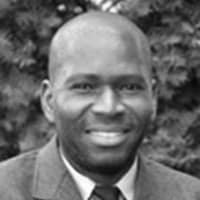
Jonas E. Alexis has degrees in mathematics and philosophy. He studied education at the graduate level. His main interests include U.S. foreign policy, the history of the Israel/Palestine conflict, and the history of ideas. He is the author of the new book Zionism vs. the West: How Talmudic Ideology is Undermining Western Culture. He teaches mathematics in South Korea.
ATTENTION READERS
We See The World From All Sides and Want YOU To Be Fully InformedIn fact, intentional disinformation is a disgraceful scourge in media today. So to assuage any possible errant incorrect information posted herein, we strongly encourage you to seek corroboration from other non-VT sources before forming an educated opinion.
About VT - Policies & Disclosures - Comment Policy



